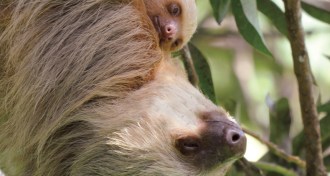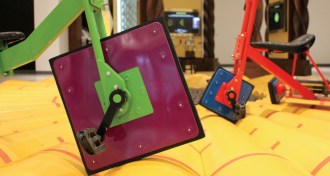All Stories
-
 Health & Medicine
Health & MedicineStudy on pregnant women’s driving has some potholes
New study finds that pregnancy makes women get into more car accidents, but there could be a simpler explanation.
-
 Physics
Physics‘The Sound Book’ explores echoes, bad acoustics and more
Acoustic engineer Trevor Cox provides an international tour of aural amazements.
By Sid Perkins -
 Particle Physics
Particle PhysicsProposed experiment would create matter from light
Photon collider would convert light into electrons and positrons.
By Andrew Grant -
 Life
Life‘The Amoeba in the Room’ uncloaks a hidden realm of tiny life
Mycologist Nicholas Money reveals the secret (and dramatic) lives of amoebas, bacteria, fungi and other often-overlooked microbes in The Amoeba in the Room: Lives of the Microbes.
-
 Animals
AnimalsFor upside-down sloths, what goes down can’t come up
Upside-down sloths have to hold their organs up and their food down.
By Susan Milius -
 Math
MathNational Museum of Mathematics is antidote to math phobia
New York's National Museum of Mathematics offers a physical, tactile, even rambunctious presentation of math.
-
 Science & Society
Science & SocietyCancer research scores big at Intel ISEF
An innovative statistical analysis of cancer-promoting genes earned a 15-year-old the top prize — and $75,000 — at the Intel International Science and Engineering Fair 2014.
By Sid Perkins -
 Astronomy
AstronomySun’s sibling spotted
A nearby star may have come from the same birth cluster as the sun; learning how to find other solar siblings could point the way to their common origin.
-
 Health & Medicine
Health & MedicineFeedback
Readers question pertussis vaccination scheduling, share stories about earthquakes and more.
-
 Science & Society
Science & SocietyOne of the best ways for kids to learn science: by doing it
A biodegradable Band-Aid. A low-cost, ultrasonic guide to parallel parking. A reinvention of the toilet. These were among the nearly 1,400 science fair projects on display at the 2014 Intel International Science and Engineering Fair. Science News’ parent organization, the Society for Science & the Public, has run the annual event since 1950.
By Eva Emerson -
 Cosmology
CosmologyThe mysterious boundary
A debate has arisen over whether an astronaut passing a black hole’s point of no return would get stretched to death or flash-fried. Resolving the controversy may lead to new insights about gravity and more.
By Andrew Grant -
 Humans
HumansBig babies: High birthweight may signal later health risks
A high birthweight might signal health risks later in life.
By Nathan Seppa